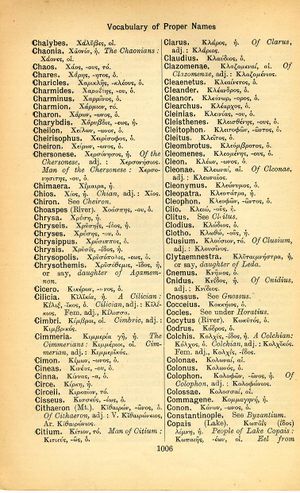Circe
ἑρμηνεία διὰ τῆς ὀνομασίας → expression by means of language
English > Greek (Woodhouse)
Κίρκη, ἡ.
Latin > English (Lewis & Short)
Circē: ēs (
I gen. Circae, Liv. And. ap. Fest. s. v. topper, p. 270; Verg. A. 3, 386: Circes, Prop. 3 (4), 12, 27; acc Circam, Plaut. Ep. 4, 2, 34 Ritschl; Cic. N D. 3, 21, 54; together with Circen, id. ib. 3, 19, 48; v. Inscr. Orell. N. cr.; abl. Circā, Hor. Epod. 17, 17; Tert. Spect. 8; cf. Charis. 1, 15, p. 46), f., = Κίρκη, the daughter of the Sun and of Perse or Perseis, sister of Æetes, a sea-nymph, distinguished for her magic arts, whose abode, after her flight from Colchis, was said to be in the region of the promontory of Circeii, in Latium, Cic. N. D. 3, 19, 48; id. Off. 1, 31, 113; Verg. E. 8, 70; id. A. 7, 20 and 282, Ov. M. 4, 205; 13, 968; 14, 10; 14, 247 sq.; 14, 312 sq.; id. R. Am. 263; 287; Hyg. Fab. 125; 156; 199; Plin. 25, 2, 5, § 10; Tib. 2, 4, 55; Hor. C. 1, 17, 20; id. Ep. 1, 2, 23 et saep.—Traces of divine homage paid to her among the Circeii; v. in Inscr. Orell. 1849; cf. Cic. N. D. 3, 19, 48.—Hence,
II Circaeus, a, um, adj., pertaining to Circe, Circean. poculum, Cic. Div. in Caecil. 17, 57: gramen, i. e. magical, poisoning, Prop. 2, 1, 53: campi, i e. the region of Colchis, the native land of Circe, Val. Fl. 5, 328; 6, 426, where also is the town Circæum, Plin. 6, 4, 4, § 13: litus, the Circeian promontory, Ov M. 14, 248; cf. id. ib. 14, 348: terra, Circeii, Verg. A 7, 10: moenia, i. e. Tusculum, after its builder, Telegonus, the son of Circe, Hor. Epod. 1, 30; cf. dorsum, the Hill of Tusculum, Sil. 7, 692.

